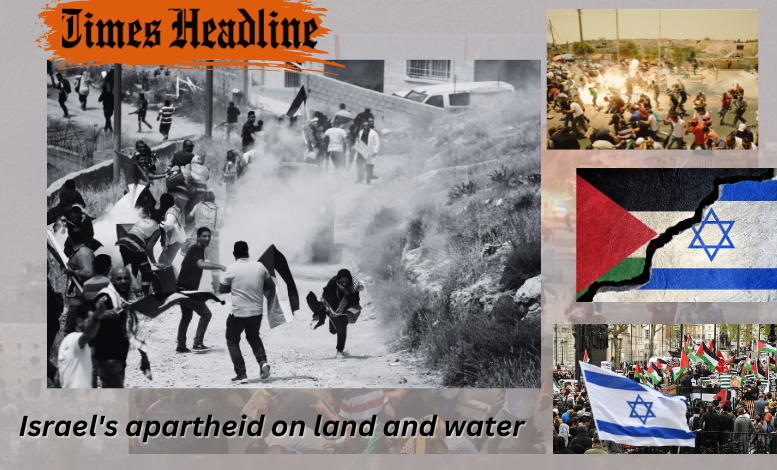The crux of colonization involves a foreign group dispossessing indigenous communities of their land, water and resources to exploit them. It is easier to have control of the masses by creating a disconnect between them and their land, culture , produce etc. Israel’s occupation onto Palestinians and their land has been going on for the past 75 years. Steadily the Israeli apartheid state has isolated and created the divide between the Palestinian people and their land. Apartheid refers to policies intended to elevate one racial group over another, with the goal of maintaining the dominant group’s hegemony. Israel’s actions towards Palestine have been described as apartheid by many human’s rights organizations like Amnesty. The Israeli state directly controls 93 percent of the land in the country, including occupied East Jerusalem.1
History of dispossession
In 1947, the United Nations adopted Resolution 181, known as the Partition Plan, which sought to divide the British Mandate of Palestine into Arab and Jewish states. On May 14, 1948, the State of Israel was created, sparking the first Arab-Israeli War. The war ended in 1949 with Israel’s victory, but 750,000 Palestinians were displaced, and the territory was divided into 3 parts: the State of Israel, the West Bank (of the Jordan River), and the Gaza Strip.2 Israel expelled hundreds of thousands of Palestinians and destroyed hundreds of Palestinian villages, in what amounted to ethnic cleansing. This is called the Nakba which translates to “ the disaster”.
In the 1967 war, Israel occupied these territories (Gaza Strip and the West Bank) including East Jerusalem, which was subsequently annexed by Israel. The war brought about a second exodus of Palestinians, estimated at half a million.3
Since 2002, Israel has adopted a policy of prohibiting Palestinians from the West Bank and Gaza from gaining status in Israel or East Jerusalem through marriage, thus preventing family unification. On top of that, Palestinians require certain licenses and permits to have to build structures like tents which they are rarely issued. In fact , such structures or Palestinian belonging structures are demolished claiming them to be “illegal settlements”. 4
Agricultural Demographic
Under colonisation, settlers either commodify indigenous produce for global export or completely erase and replace them with other produce. Such produce is either identified with settler culture or in demand within international markets. Palestine is known for its olives, olive oil and vegetables, which are exported far and wide. The olive trees, in particular, are an important symbol of Palestinians’ attachment to their land. Since 1967, more than eight hundred thousand Palestinian olive trees have been illegally uprooted by Israeli authorities and settlers. Many were centuries old. In the occupied West Bank, Israeli settlers have been documented attacking Palestinians on their lands, stealing their olives and setting fire to their groves.
In the last several years, settlers established new “shepherd farms” through violence and with the help of the Israeli military and police, and managed to take control of many of the last grazing and agricultural areas that were available for the Palestinian communities. 5
According to the Centre for Economic Policy Research (CEPR), agriculture employs 13.4 percent of the population formally, though informally it employs about 90 percent of those who work. In Gaza, agriculture offers life-saving job opportunities in a region rife with unemployment. These opportunities have diminished on a large scale due to incessant bombing in Gaza which has polluted the soil, water and air with harmful chemicals. With this, the Gaza border has restricted the movement and confined Palestinians to zones which makes trade of their produce difficult.
Water control
In Jordan Valley, West Bank, the water allotted to the farmers by the state of Israel is not nearly enough to nourish their crops, whereas settlers receive large amounts of water for global produce like strawberries, bananas etc. 6 Palestinians who try to install their own water pipeline or tanks have to get permits from Israeli authorities which they’re rarely granted. In the West Bank, Israel has been in control of the water since 1967 .
Gaza has only one source of renewable freshwater which is the Coastal Aquifer. the aquifers beneath the West Bank, the Coastal Aquifer has been under total Israeli control since the occupation began. 7 In 2020, Approximately 97 percent of that groundwater was unfit to drink due to high sewage and salinity levels. In the West Bank, 92 percent Palestinians according to B’Tselem store water in tanks due to acute water shortage . But Israeli authorities have made it illegal for Palestinians to collect rainwater in such conditions as well.
Conclusion
In summary, Israel’s occupation of Palestinian land embodies colonization and apartheid, dispossessing Palestinians of their resources and livelihoods. The deliberate destruction of olive groves, restrictions on water access, and systematic marginalization highlight the ongoing oppression faced by Palestinians. International condemnation and advocacy through bodies like NGOs and the UN are essential to address these injustices and work towards decolonisation. It’s imperative to recognize and rectify the systemic laws that bind Palestinian rights and their ownership of land.
Sources
- https://www.hrw.org/news/2020/05/12/israel-discriminatory-land-policies-hem-palestinians
- https://www.cfr.org/global-conflict-tracker/conflict/israeli-palestinian-conflict#:~:text=The%20Israeli%2DPalestinian%20conflict%20dates,into%20Arab%20and%20Jewish%20states.
- https://www.un.org/unispal/history/
- https://www.amnesty.org/en/latest/campaigns/2022/02/israels-system-of-apartheid/
- https://thewire.in/world/israeli-settlers-are-using-the-ongoing-violence-to-ethnically-cleanse-palestinians-in-jordan-valley
- https://www.aljazeera.com/amp/news/2017/10/21/how-israel-engages-in-water-apartheid
https://www.middleeasteye.net/opinion/how-israel-weaponises-water-gaza-strip

